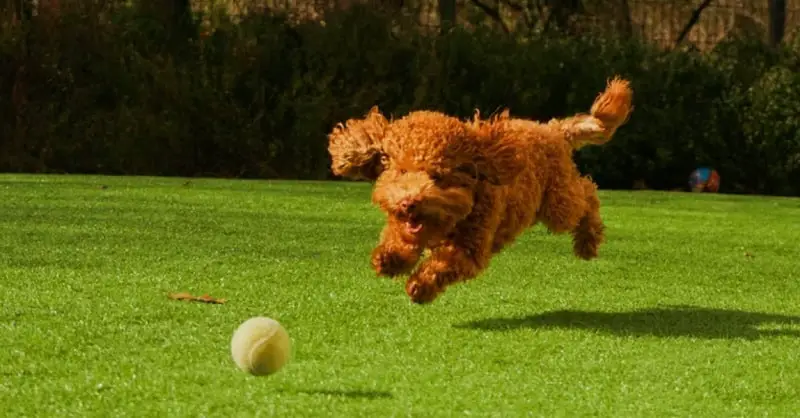It seems a strange question to ask. What do dogs have to do with tennis balls? But, on second thoughts, it is a weighty question if asked by a pet parent who regularly plays fetch with her dog using the fuzzy ball.
So can tennis balls make your dog ill? Yes, in simple terms, tennis balls might make your dog sick if proper care isn’t taken but, then again, there are so many other things that can harm him. So, why talk only of tennis balls?
A dog parent will be worried if his/her best friend has easy access to these colorful toys and chews and tears them apart. The other harmful things may not be easily accessible. The question will most naturally occur to her.
Table of Content
Illnesses & Issues Associated with Tennis Balls for Dogs
Choking and Bowel Obstruction
Ingestion of foreign objects is one of the common causes of injuries among dogs.
Dogs will chew at anything, shoes and all. They will chew and try to swallow whatever they can get into their mouth. An insurance company has listed ten things that dogs commonly chew and swallow.
The list includes socks, underwear, pantyhose, corn cobs, and balls; the company has used the generic term “balls” and not the specific term “tennis balls”.
Also Read:
Why Do Dogs Chew?
It is perfectly normal for dogs to chew things. They do so for a variety of reasons. They might do it out of boredom or because of separation anxiety.
But even otherwise, dogs have this habit. It is nature’s way of making dogs work their jaws and keep their teeth clean.
It should be easy enough for a strong dog to break open a tennis ball and shred it to pieces. If the shreds get stuck in the throat, they might cause choking; it could even be life-threatening. Or, if the objects get lodged in the bowel, it could require surgery.
Dental Problems
Tennis balls are made from natural and synthetic rubber. The rubber, after the curing stages, is shaped into half-shells under high pressure and temperature. Two half-shells are cemented together, and the felt is glued around the core.
So, a lot of adhesives and glue, which are chemicals, after all, go into manufacturing the tennis balls. The wooly felt does a good job of trapping dirt and grit as the ball rolls on the lawns.
A dog’s teeth have less enamel than human teeth. If your dog has the habit of chewing tennis balls, the dirt and grit rubbing against the teeth could erode the enamel.
It would, however, take chewing a lot of balls to cause any real dental injury. But you cannot dismiss the threat altogether because periodontal conditions are also quite common among dogs. Moreover, the back teeth of dogs could break from chewing on hard objects.
One thing is clear: Whether or not your dog spoils his teeth from gnawing at the ball, it is going to ingest the dirt, grit, and chemicals. You would not like that!
Tennis balls can contain trace amounts of lead, which the International Agency for Research on Cancer (IARC) says is “probably carcinogenic to humans”. So, the risk of cancer also does not seem to be great from chewing tennis balls. However, your pooch is like a child, and you would like to protect him from even the remotest danger.
Also Read:
Airway Obstruction
Playing fetch with your dog is a great way to bond with him. Fetching and retrieving things are essential to his training, and to keep him lean and fit.
But, carrying a ball in his mouth is likely to somewhat obstruct his breathing. If your pooch has to do this for a prolonged period, it is going to be uncomfortable.
The activity is okay for some time; after that, it would be better to keep the ball away from its reach. Playing fetch in warm conditions, especially, would not be good for the dog.
Alternative Options to Tennis Balls for Dogs
For every chew-toy described as indestructible by sellers, there is some reviewer who has said their dog destroyed the product within minutes of unpacking it.
They say they have spent money like water on buying “indestructible” toys, and their dogs have proved the sellers wrong.
Kong toys have received good reviews, but aggressive chewers have made mincemeat of Kong toys as well. These toys are used by the police and the military to train their dogs.
The toys can carry a treat inside them as a reward for your pooch. However, it is best not to offer frequent treats to dogs; it could lead to obesity problems, or your dog might refuse to eat his regular food.
Those who have found no success with Kong have tried Goughnuts, which the sellers describe as a “virtually indestructible ring”. The item is said to be made from the same rubber the astronauts use.
Some reviewers have mentioned the record time in which their dogs destroyed it. The Goughnuts do not float; if you are looking for floating toys, this is not for you.
The Chuckit! has also received a large number of reviews, but, as before, you cannot get the better of an aggressive chewer.
It seems the answer lies in training your dog not to chew inappropriate things. Dogs respond to training. So, there should be some gentle way to teach dogs what is okay to chew and what is not.
It would be okay to play fetch with your dog for a short time and then tuck away the ball; playing often and for long periods could lead to physical injuries and joint problems besides providing ample opportunity to chew.
Tennis Players and Their Dogs
It seems a dog’s great love for chewing tennis balls should have made him the tennis players’ worst enemy. But that does not seem to be the case. A lot of tennis players prefer dogs over other pets.
Dog lovers among tennis players include Novak Djokovic, Serena Williams, Dominic Thiem, Ashleigh Barty, Andy Murray, Venus Williams, Maria Sharapova, and Martina Navratilova.
Final Thoughts on the Effect of Tennis Balls on Dogs
Why single out the tennis ball? If your dog is a chewer, he may chew much more damaging things. Websites of pet insurance companies usually carry stories about dogs that had swallowed socks or blanket pieces and needed surgery.
The pet parents suffer a great deal of anxiety at such moments, not to speak of the huge vet bills they have to pay up.
Therefore, it is necessary to correct your dog’s destructive chewing habit. Exercising every day could reduce his boredom-induced chewing habit. It would also be a good idea to put the stuff he likes to put into his mouth out of his way.


